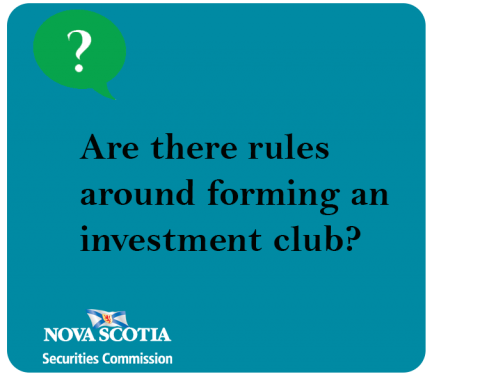Submitted by nsscadmin on

Not too long ago our general inquiries email received a question from a Nova Scotia investor interested in starting an investment club. He wanted to know if there were any rules or regulations around starting an investment club under securities laws. There are some rules buried in securities laws that can be hard to find. To help you avoid digging through the rules and national instruments we’ll explain these rules and where they are.
First though, some of you may be wondering what is an investment club? To put it simply, an investment club is a group of people that pool their money to invest. This larger pool of money allows people to make investments they may not be able to afford alone. Individuals in the group are usually tasked with researching investments and presenting investment opportunities to the group.
Investment clubs are usually organized with certain members in leadership positions, and there may also be members tasked with keeping the books. When a club is first organized other questions need to be answered, such as how much one needs to contribute upfront and what will be the required regular contributions for members.
Some of the benefits of an investment club include the aforementioned ability to invest in more expensive investments that may be out of reach of an individual investor. Also, investing through an investment club can potentially save money on commission or fees. For example, if an investment club of 10 people purchases 20 shares in a company they could do so in one transaction paying one commission or fee. If those 10 people were to individually purchase those shares they would each pay their own commission or fees.
Now let’s talk about how investment clubs fall under securities laws. You’ll find regulations pertaining to investment clubs in National Instrument 31-103: Section 8.10, and in National Instrument 45-106: Section 2.20.
National Instrument 31-103: Section 8.10 deals with registration requirements, exemptions and ongoing registrant obligations. National Instrument 45-106: Section 2.20 deals with prospectus exemptions.
Under NI 31-103: Section 8.10 it states the registration requirement for trading securities of an investment fund does not apply to an investment club if:
1) the fund does not have more than 50 beneficial security holders
2) the fund does not borrow money from the public
3) the fund does not distribute securities to the public
4) the fund does not pay or give any renumeration for investment management or administration advice for the trading of securities other than brokerage fees
5) the fund, for the purpose its operations requires security holders to make contributions in proportion to the securities held by them
You’ll find many of the same provisions under NI 45-106: Section 2.20 which states the prospectus requirement does not apply to a distribution of an investment fund if the investment fund:
1) has no more than 50 beneficial securities holders
2) does not borrow money from the public
3) does not distribute securities to the public
4) does not pay or give any renumeration for investment management or administration advice for the trading of securities other than normal brokerage fees?
5) for the purpose its operations requires security holders to make contributions in proportion to the securities held by them
As long as these requirements are followed anyone starting or part of an investment fund does not need to registered and does not need to file a prospectus.
Before entering an investment club be sure your club has an organized structure and all rules on investing are clearly set out. It is also recommended you investigate all tax implications around investment clubs as outlined by CRA.
